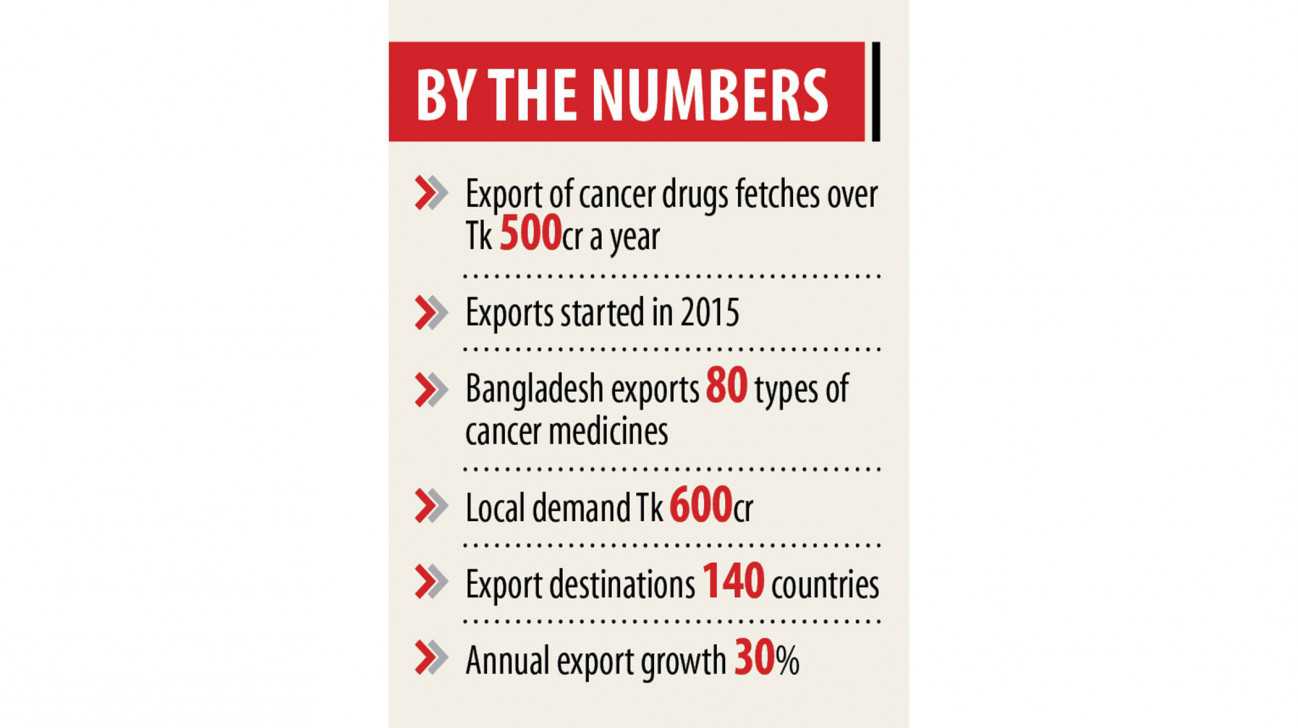What others can study from Bangladesh on making cancer drugs available

Image collected
In conditions of making cancer drugs available, Bangladesh may be the perfect role model for a fairytale turnaround.
Just six years back lots of the lifesaving medications needed to be imported, posing risks of unavailability, high costs and price fluctuations.
Now regional pharmaceuticals not only meet 80 % of the country's demand but also export to at least 140 countries, starting off with limited level shipments in 2015.
So much in order that cancer drugs take into account nearly half of most pharmaceutical products being exported.
To place things into perspective, Bangladesh exported cancer drugs worth over Tk 500 crore this past year, while shipment of other medications hit around Tk 656 crore.
Meanwhile local cancer medicine sales amounted to about Tk 600 crore. Demand keeps growing by 15 % on an average each year, according to the manufacturers.
Along with typical chemotherapy drugs, native pharmaceutical companies manufacture most up-to-date oncology products such as monoclonal antibodies, oral targeted therapies and liposomal technology items.
They also manufacture a lot of the supportive prescription drugs necessary for cancer treatment such as for example zoledronic acid, filgrastim and pegfilgrastim injection.
And all it took was meticulous focus on quality and policy support.
In the past 10 years, pharmaceutical companies such as for example Eskayef, Renata, Incepta, Healthcare, Beacon, Techno Pharma and Julphar attended to manufacture more than 80 types of ontological drugs.
Yet to create exports, Eskayef Bangladesh plans getting into the global arena for the very first time with cancer drugs.
"We have a plan to go in the global market on coming days. Consequently we are taking preparation," explained its director for advertising and revenue, Mohammad Mujahidul Islam.
"Eskayef will create a global class new facility for oncology, which is the biggest one found in the South Asian place, for grabbing the global industry," he said.
And it is on the right course too, with its present state-of-the-art manufacturing unit having attained approvals of numerous regulatory bodies.
They include the EU Good Production Practice, the Medications and Healthcare Products Regulatory Company of the united kingdom, the Therapeutic Goods Administration of Australia, the United Arab Emirates Good Developing Practice, and the Veterinary Medications Directorate of the united kingdom.
Beacon Pharmaceuticals alternatively lays claim to making 80 per cent of the country's export of cancers drugs of around 80 types used in chemotherapy and oral targeted therapy.
Bangladesh's export of cancers prescription drugs is increasing by around 30 to 35 per cent year-on-year, said it has the director for global organization development, Monjurul Alam.
Oncology products were beyond the getting power of patients during the past but prices transpired by 40 % when Beacon started production through compliance with high standards, he said.
Bangladesh's drugs will be winning the global industry for their top quality and low prices; the drugs are cheaper than those supplied by the developed community, he added.
Renata, which generates cancer drugs employed for oral therapies, can be concentrating on the markets found in Nepal, Sri Lanka, Bhutan and the Philippines, said Ananta Saha, its international organization manager.
He attributed the expansion found in exports to the drugs being cheaper seeing that Bangladesh, being truly a least developed region, does not need to purchase patents.
There is scope for sustained development, since customs processes are flexible for lifesaving medicines. Moreover, only the physician's prescription is required for any individual to take the drugs from one nation to some other, he said.
"Pharmaceutical products are essential for all countries. That is why the industry's exports didn't decline amid the Covid-19 outbreak. Alternatively it rose," said Saha.
Locally produced cancer drugs are of internal standard and cheaper than imported ones, which is helping cancer treatment in Bangladesh, said Md Azizul Islam, consultant physician general and expert of medicine and oncology at Bangladesh MILITARY.
He believes it could not be much time that local pharmaceutical firms will manufacture all sorts of cancer drugs.
Source: https://www.thedailystar.net
Tags :
Previous Story
- Bata Shoe sinks into losses for the first...
- Little businesses to get right up to Tk50...
- How exactly to revive our apparel exports
- Twitter faces backlash above handling of anti-Semitic posts
- Covid-19 compelling people to select lower-grade jobs for...
- OP-ED: How Covid-19 could condition the future of...
- Jaishankar lauds Bangladesh’s monetary growth
- A strong bank operating system makes a strong...